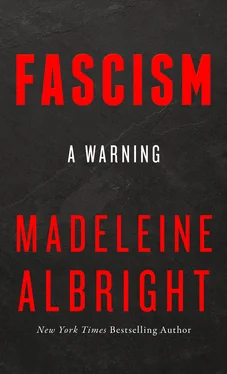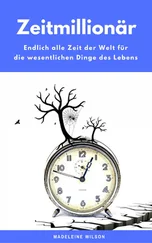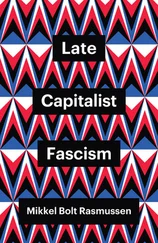Historian Robert Paxton begins one of his books by asserting: “Fascism was the major political innovation of the twentieth century, and the source of much of its pain.” Over the years, he and other scholars have developed lists of the many moving parts that Fascism entails. Toward the end of our discussion, my class sought to articulate a comparable list.
Fascism, most of the students agreed, is an extreme form of authoritarian rule. Citizens are required to do exactly what leaders say they must do, nothing more, nothing less. The doctrine is linked to rabid nationalism. It also turns the traditional social contract upside down. Instead of citizens giving power to the state in exchange for the protection of their rights, power begins with the leader, and the people have no rights. Under Fascism, the mission of citizens is to serve; the government’s job is to rule.
When one talks about this subject, confusion often arises about the difference between Fascism and such related concepts as totalitarianism, dictatorship, despotism, tyranny, autocracy, and so on. As an academic, I might be tempted to wander into that thicket, but as a former diplomat, I am primarily concerned with actions, not labels. To my mind, a Fascist is someone who identifies strongly with and claims to speak for a whole nation or group, is unconcerned with the rights of others, and is willing to use whatever means are necessary—including violence—to achieve his or her goals. In that conception, a Fascist will likely be a tyrant, but a tyrant need not be a Fascist.
Often the difference can be seen in who is trusted with the guns. In seventeenth-century Europe, when Catholic aristocrats did battle with Protestant aristocrats, they fought over scripture but agreed not to distribute weapons to their peasants, thinking it safer to wage war with mercenary armies. Modern dictators also tend to be wary of their citizens, which is why they create royal guards and other elite security units to ensure their personal safety. A Fascist, however, expects the crowd to have his back. Where kings try to settle people down, Fascists stir them up so that when the fighting begins, their foot soldiers have the will and the firepower to strike first.
FASCISM CAME INTO BEING EARLY IN THE TWENTIETH CENTURY, A time of intellectual liveliness and resurgent nationalism coupled with widespread disappointment at the failure of representative parliaments to keep pace with a technology-driven Industrial Revolution. In previous decades, scholars such as Thomas Malthus, Herbert Spencer, Charles Darwin, and Darwin’s half cousin Francis Galton had propagated the idea that life is a constant struggle to adapt, with little room for sentiment, and no assurance of progress. Influential thinkers from Nietzsche to Freud pondered the implications of a world that had seemingly broken free of its traditional moorings. Suffragettes introduced the revolutionary notion that women, too, have rights. Opinion leaders in politics and the arts spoke openly about the possibility of bettering the human species through selective breeding.
Meanwhile, astonishing inventions such as electricity, the telephone, the horseless carriage, and steamships were bringing the world closer together, yet those same innovations put millions of farmers and skilled craftsmen out of their jobs. Everywhere, people were on the move as rural families crowded into cities and millions of Europeans pulled up stakes and headed across the ocean.
To many of those who remained, the promises inherent in the Enlightenment and the French and American Revolutions had become hollow. Large numbers of people could not find work; those who did were often exploited or later sacrificed in the bloody chess game played out on the battlefields of World War I. Winston Churchill wrote of that tragedy, “Injuries were wrought to the structure of human society which a century will not efface.” But with the aristocracy discredited, religion under scrutiny, and old political structures, such as the Ottoman and Austro-Hungarian Empires, breaking up, the search for answers could not wait.
The democratic idealism put forward by President Woodrow Wilson was first to seize the public’s imagination. Even before the United States entered the war, he proclaimed the principle that “every people has a right to choose the sovereignty under which they shall live.” This doctrine of self-determination helped secure postwar independence for a handful of mostly smallish European countries, and his plan for a world organization blossomed into the League of Nations. Wilson, though, was politically naïve and physically frail; America’s global vision did not survive his presidency. The United States rejected the League and, under Wilson’s successors, washed its hands of European affairs at a time when the continent’s recovery from conflict was not going well.
Many governments that started out liberal after the war were confronted by explosive social tensions that seemed to demand more repressive policies. From Poland and Austria to Romania and Greece, fledgling democracies took wing, then plunged back to earth. In the East, fierce Soviet ideologues were purporting to speak for workers everywhere, thus haunting the sleep of British bankers, French ministers, and Spanish priests. In Europe’s center, an embittered Germany struggled to regain its footing. And in Italy a rough beast, its hour come round at last, was striding forth for the first time.
TWO

THE GREATEST SHOW ON EARTH
THOMAS EDISON HAILED HIM AS THE “GENIUS OF THE MODERN age”; Gandhi, as a “superman.” Winston Churchill pledged to stand by him in his “struggle against the bestial appetites of Leninism.” Newspapers in Rome, host to the Vatican, referred to him as “the incarnation of God.” In the end, people who had worshipped his every move hung his corpse upside down next to his mistress’s near a gas station in Milan.
Benito Mussolini was ushered into the world in Predappio, a small farming town forty miles northeast of Florence, in 1883. His father was a blacksmith and a Socialist, his mother a teacher and devout. He grew up in a two-room cottage attached to the one-room school where his mother taught. His family was comfortable but unable to afford full tuition at the priest-run boarding academy that he began attending at age nine. There, during meals, the wealthier students were assigned to one table, Benito and his companions to another—an indignity that kindled in Mussolini a lifelong rage against injustice (to him). The boy was full of mischief, often pilfering fruit from farmers and getting into fights. At eleven he was expelled for stabbing a fellow pupil in the hand, and at fifteen he was suspended for knifing a second classmate in the buttocks.
But Benito was also a reader. He loved to sit alone with the daily newspapers and the thousand-plus pages of Les Misérables . From his father he inherited a liking for bold action; his mother taught him patience—the twig bent his father’s way. In college, when other students griped to each other about the staleness of the bread they were supposed to eat, Mussolini confronted the rector one on one, causing his classmates to cheer, the rector to back down, and the bread to come freshly baked.
School days behind him, Mussolini earned a teacher’s certificate but lacked discipline in the classroom and was quickly cut loose. At nineteen, he headed to Switzerland, where he worked as a laborer, slept on a packing crate, and was jailed—the first of many arrests—for vagrancy. Out of prison, he got a job as a bricklayer and soon became active in the local union. This was a period in Europe when labor politics tilted sharply to the left and Socialist firebrands preached anger toward the government, contempt for the Church, and militancy on behalf of workers’ rights. Mussolini was not an original thinker, but he was a gifted actor who could play a role. Though neatly dressed in private, he often refrained from shaving or combing his hair before appearing in public. Prior to a speech, he rehearsed diligently so that he might sound spontaneous. He knew the value of the popular touch and usually succeeded in eliciting whoops of approval from his audience. Before long, he had come to consider himself a man of destiny—the next Napoleon, perhaps, or Augustus Caesar.
Читать дальше













